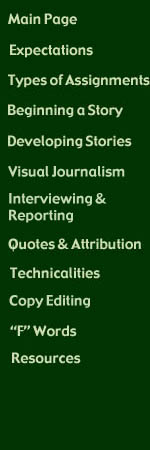

Quotes and Attribution
(printable version here)
Writers that wish to include quotes and information from sources or research must learn to properly attribute that information. Reporting for the Media has checklists for using quotes and attributes and here tips that are particularly helpful to beginning writers are included.
Quotations
Place only the exact words of the source within quotation marks.
This rule is often broken because beginning writers feel it necessary to clean up bad grammar or include a word that clarifies the quotation. Although accepted styles vary greatly for this rule, generally if a quote from the source is not clear or adding an element to the story, do not use use it. Writers should remember that they can not put words in their sources' mouths when writing, but only hope to get them to say what's desired.
For a one-paragraph quotation that includes two or more sentences, place the quotation marks only at the beginning and end of the entire quotation, not at the beginning and end of each sentence.
Remember: report only the source's answers, not the questions you asked.
Each quotation should serve a purpose, such as reveal a source's character, describe or emphasize a point, or present an opinion.
Quotes are the muscle of a story. Stories written with plenty of adjectives are weak and don't present the reader with an objective opinion. However, quotes bring stories to life. Think of them as a pop-up image from a page, describing all the things a writer cannot.
For example, if a woman insults someone and calls them a lint licker, quote it. The line might read, "Madison called Monroe a "filthy lint licker" before she threw an antique vase valued over $5,000 to the floor." (Madison and Monroe are last names) As this is an unusual detail for a heated argument, it's worth being quoted. Writers should ramble through their stockpile of quotes and choose only the best to include in their story.
All direct quotations should be clear, concise, relevant and effective.
Remember this. Quotes bring the story to life.
Attribution
1. Attribute all second-hand information, criticisms, statements about controversial issues, opinions, and all direct and indirect quotations.
Remember to not attribute undisputed facts. Barack Obama being the the president should not be attributed, whereas someone citing their opinion on the president should.
2. Punctuate the attribution properly. Put a comma after attribution introducing a one-sentence quotation and a colon after attribution introducing two or more sentences of quotation.
Writers need to know to properly attribute, SOMEONE SAID, not SAID SOMEONE. Similarly, naturally one would say "she/he said" rather than "said she/he".
Exception: When attributing a long title to a source, the order is reversed. For example, "Nationwide, Nordstorm's sales are flourishing. It's like Christmas came early," said Jamie Houston, Vice President of Marketing for Nordstorm.
3. Put the attribution at or near the beginning of a long quotation. Readers need to know who is saying what in a long quotation.
4. Attribution that appears in the middle of a sentence should come at a natural break rather than interrupt a thought.
Example: a man named Logan Greene says, "For years it's been profitable being a mechanic in this city, but now I don't know what I'll do because they're all different. They said training could take up to 6 months. My family doesn't have that much time."
This is a long quite quote, so to break up - stop at natural pauses.
WRONG: "For years," Logan Greene said, "it's been profitable being a mechanic in this city."
RIGHT: "For years it's been profitable being a mechanic in this city," Logan Greene said. "They said training could take up to six months."
Other Disciplines | Writer's Web | Writing Center | Make
an Appointment | Library | Department of Journalism
Copyright Info